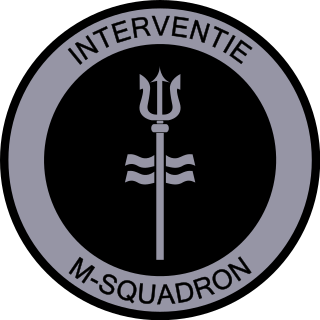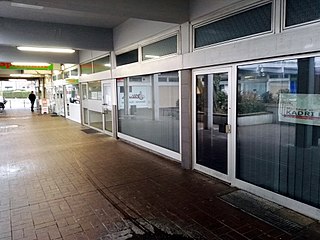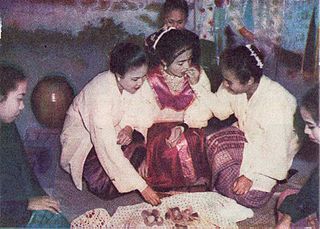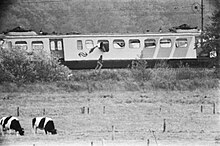
Juliana was Queen of the Netherlands from 1948 until her abdication in 1980.

Petrus Jozef Sietse "Piet" de Jong was a Dutch politician and naval officer who served as Prime Minister of the Netherlands from 1967 to 1971. He was a member of the now-defunct Catholic People's Party (KVP), later merged into the current-day Christian Democratic Appeal (CDA).

M-Squadron, formerly the Unit Interventie Mariniers, and before that known as the Bijzondere Bijstandseenheid, is an elite Dutch special forces unit which is tasked with conducting domestic counter-terrorist operations. M-Squadron is part of the Netherlands Maritime Special Operations Forces of the Netherlands Marine Corps.

South Maluku, also South Moluccas, officially the Republic of South Maluku, is an unrecognised secessionist republic that originally claimed the islands of Ambon, Buru, and Seram, which currently make up the Indonesian province of Maluku.

The Den Uyl cabinet was the executive branch of the Dutch Government from 11 May 1973 until 19 December 1977. The cabinet was formed by the social-democratic Labour Party (PvdA), the christian-democratic Catholic People's Party (KVP) and Anti-Revolutionary Party (ARP), the progressive Political Party of Radicals (PPR) and the social-liberal Democrats 66 (D'66) after the election of 1972. The cabinet was a Centre-left grand coalition and had a substantial majority in the House of Representatives with Labour Leader Joop den Uyl serving as Prime Minister. Prominent Catholic politician Dries van Agt, the Minister of Justice from the previous cabinet, served as Deputy Prime Minister until his resignation. Prominent Protestant politician Gaius de Gaay Fortman the Minister of the Interior assumed the office of Deputy Prime Minister on 8 September 1977.

Wijster is a village in the Dutch province of Drenthe. It is a part of the municipality of Midden-Drenthe, and lies about 11 km north of Hoogeveen.

Bovensmilde is a village in the Netherlands' province of Drenthe. It is a part of the municipality of Midden-Drenthe, and lies about six kilometers (3.7 mi) southwest of Assen.

De Punt is a village in the Dutch province of Drenthe. It is a part of the municipality of Tynaarlo, and lies about 11 km south of Groningen. The village closely cooperates with Yde and they are often referred to as Yde-De Punt, however both are still separate villages.
Free South Moluccan Youth was a terrorist organization with the proclaimed goal of restoring South Moluccan independence from Indonesia. The group and its factions were responsible for several attacks in the Netherlands in the late 1970s.

On the morning of Monday 23 May 1977, four armed South-Moluccans took 105 children and their five teachers hostage at a primary school in Bovensmilde, Netherlands. At the same time nine others hijacked a train in the nearby De Punt. Both hostage crises lasted for twenty days before being ended by military interventions.

On 2 December 1975, seven South Moluccans seized a train with about 50 passengers on board in open countryside near the village of Wijster, halfway between Hoogeveen and Beilen in the northern part of the Netherlands. The hijacking lasted for 12 days and three hostages were killed.

On 4 December 1975, seven armed Moluccans raided the Indonesian consulate in Amsterdam in support of a train hijacking near the village of Wijster which had started two days before. After taking 41 hostages, including 16 children, the terrorists moved into the Indonesian consulate in Amsterdam, towards the top floor. Several consulate employees climbed out of the consulate via a rope. One attempted to jump to the ground, but fell 30 feet (9.1 m) and died five days later from his injuries in a hospital.

On the morning of Monday March 13, 1978, at 10:15, three South-Moluccans seized the Province Hall in Assen, Netherlands. Some of the people inside escaped by jumping out of the window, including the Queen's Commissioner of the Drenthe province. 16 women and 55 men were taken hostage. Two people were killed.

The Gladbeck hostage crisis or Gladbeck hostage drama was a bank robbery and hostage-taking that took place in West Germany from 16 to 18 August 1988. Two men with prior criminal records – Hans-Jürgen Rösner and Dieter Degowski – robbed a branch of the Deutsche Bank in Gladbeck, North Rhine-Westphalia, taking two employees as hostages. During their flight, they were joined by Rösner's girlfriend Marion Löblich, with whom they hijacked a public transport bus in Bremen. With twenty-seven hostages aboard, they drove towards the Netherlands, where all but two hostages were released, and the bus was exchanged for a getaway car. The hostage-taking was finally ended when the police rammed the getaway car on the A3 motorway near Bad Honnef, North Rhine-Westphalia.

Moluccans are the Austronesian-speaking and Papuan-speaking ethnic groups indigenous to the Maluku Islands, Eastern Indonesia. The region was historically known as the Spice Islands, and today consists of two Indonesian provinces of Maluku and North Maluku. As such, "Moluccans" is used as a blanket term for the various ethnic and linguistic groups native to the islands.
The Moluccan diaspora refers to overseas Indonesians of Moluccan birth or descent living outside Indonesia. The most significant Moluccan diaspora community lives in the Netherlands, where it numbers c. 70,000 people as of 2018.
John Wattilete is the fifth and incumbent president in exile of the Republic of South Maluku and has been in office since 2010. He was preceded by Frans Tutuhatunewa.

Toos Faber-de Heer was a Dutch journalist and justice information officer.


















